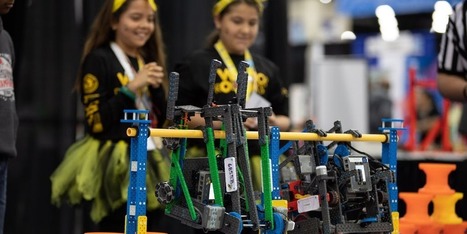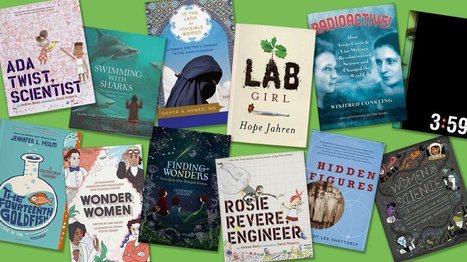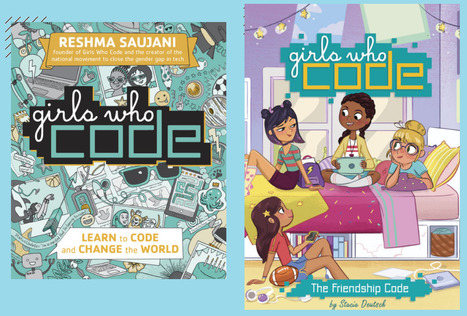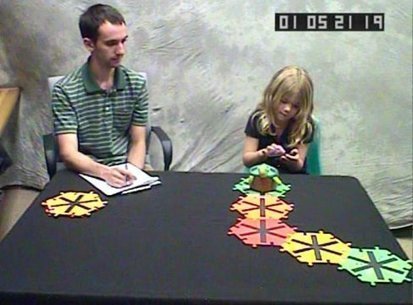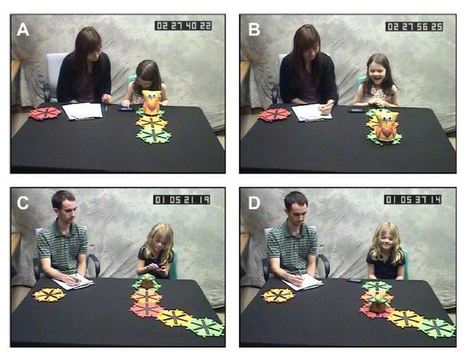 Your new post is loading...
 Your new post is loading...

|
Scooped by
John Evans
|
The Girl Powered initiative provides tools and resources to students and mentors to promote female involvement in STEM and helps create an environment where students’ confidence and abilities can flourish.

|
Scooped by
John Evans
|
Best in Public Service & Activism 2017

|
Scooped by
John Evans
|
"For the past 17 years, Techbridge Girls has been working to break down barriers that often keep young women, particularly those of color from low-income communities, out of STEM careers and the maker movement. We work to craft a new narrative that centers this population and gives them space not just to engage with STEM and making, but to believe that they can transform the maker movement to reflect their experiences and interests. Techbridge Girls supports an ecosystem for girls from grades four through 12 to experience the full breadth of STEM education and works to ignite in them the courage to pursue a STEM degree and career.
Our model is not rocket science, but it is intentional. As the Maker Movement continues to grow and expand we also need to be intentional about what voices and perspectives are represented. As educators and thought leaders, it is our responsibility to ensure that all voices and perspectives have an opportunity to come to the table, and have their voices heard. In order to support educators in their work to develop more equitable, inclusive maker education programs and practices, we are excited to share a set of 6 strategies we’ve used at Techbridge to redefine making, and create new space and opportunities for girls."

|
Scooped by
John Evans
|
Science, technology, engineering, and math are more important than ever, so we’ve put together a list of books to encourage girls to persevere in these subjects.

|
Scooped by
John Evans
|
When Sasha Ariel Alston pursued her love for coding, she noticed there were never many girls ― especially girls of color ― pursuing it, too. That’s why she decided to write a children’s book to encourage girls to learn about coding and STEM fields at an early age.
Alston is a 19-year-old Pace University student getting a major in information systems and a minor in marketing. She spent two years writing Sasha Savvy Loves to Code, a kids’ book about a 10-year-old who becomes interested in coding, just like Alston.
“The purpose of the book is just to get girls interested in coding and to provide basic coding terms,” she said.

|
Scooped by
John Evans
|
Technology diversity advocacy body Girl Geek Academy has started a new teacher training course today with the eventual aim to teach coding to girls aged from 5 to 8 years.

|
Scooped by
John Evans
|
As well as being male, I’m also a passionate teacher who has noticed some very gender-specific behaviours when working with pupils. For example, I once gave Maths doodle books to my class for showing their working out. The boys’ books looked like an arithmetic"Do young girls take a dislike to coding because it can be a messy process with plenty of chances to get it wrong?" grenade had gone off within the pages, but the girls could have placed theirs back in the cellophane for a full refund! It was nothing to do with the fact that they couldn’t do the equations. It seemed to be more around not wanting to show those failed attempts. Perfection was the key, and the messy risk-taking that proceeded was nowhere to be seen. For this reason, they loved the table whiteboards because they wipe clean every time.
So is this behaviour symptomatic of why there is such a scary deficit in women taking up coding as a career choice? Do young girls take a dislike to coding because it can be a messy process with plenty of chances to get it wrong? I believe it’s certainly one factor, but think the problem stems from a number of culprits.
|

|
Scooped by
John Evans
|
Increasing the gender diversity of the computer science faculty should be a priority for all schools as it would provide female students--as well as students of color--with role-models and mentors. In a study conducted in a suburban area near Oklahoma University, researchers examined the correlation between an after-school engineering mentoring program led by female college students and the perceptions of sixth and seventh grade girls (Holmes, Redmond, Thomas, & High, 2012). The researchers found that high quality mentoring relationships with a female role model led to an increase in the girls' confidence in their mathematics ability (Holmes et al., 2012). Similarly, seeing a confident and successful female computer science teacher could have a positive impact on girls and boys in computer science classes.

|
Scooped by
John Evans
|
Our New York Times Best Sellers, Girls Who Code: Learn to Code and Change the World and The Friendship Code are out now!

|
Scooped by
John Evans
|
The statistics are staggering. Just 24 percent of tech jobs are held by women. Roughly 74 percent of girls in middle school express an interest in STEM, but by the time they get to college, just 0.3 percent major in computer science. There will be 1.4 million new jobs in computer science by 2020, but only 3 percent will be filled by women.
Girls Who Code founder and CEO Reshma Saujani is on a mission to change that. In just five years, her organization has grown from 20 girls in New York City to 40,000 girls in all 50 states – four times the number of women who graduate with computer science degrees every year in the U.S.
“Every solution we want to find in the next 100 years will involve technology, and if you give girls entry, they won’t sit on the sidelines anymore.”
A passion for getting girls off the sidelines and into coding and computer science is behind everything Girls Who Code does through its 80 summer immersion programs and 1,000 clubs where girls learn coding, robotics, website development and app making. Because when you introduce girls to computer science (CS), they get it.|
But that introduction is a necessity.

|
Scooped by
John Evans
|
Girls start believing they aren't good at math, science and even computers at a young age -- but providing fun STEM activities at school and home may spark interest and inspire confidence, suggests a new study.

|
Scooped by
John Evans
|
There’s a lot of effort to attract women to the computer sciences at universities and the workforce. But to shift technology’s gender imbalance we might need to focus on a younger crowd. Much younger — like 6-year-olds.
For the first time, research from the University of Washington shows that by first grade, children are already embracing the stereotype that boys are better than girls at robotics and programming. At the same time, the kids believe that girls and boys are equally good or their own gender is better at math and other sciences.
And girls with the strongest negative stereotypes about their genders’ tech abilities also reported the least interest and personal skill in programming and robotics.

|
Scooped by
John Evans
|
"A new survey commissioned by Microsoft (MSFT, Tech30) found that young girls in Europe become interested in so-called STEM subjects around the age of 11 and then quickly lose interest when they're 15.
"Conformity to social expectations, gender stereotypes, gender roles and lack of role models continue to channel girls' career choices away from STEM fields," said psychology professor Martin Bauer of the London School of Economics, who helped coordinate the survey of 11,500 girls across 12 European countries.
The survey also found that girls' interest in humanities subjects drops around the same age but then rebound sharply. Interest in STEM subjects does not recover.
"This means that governments, teachers and parents only have four or five years to nurture girls' passion before they turn their backs on these areas, potentially for good," Microsoft said."

|
Scooped by
John Evans
|
When you shop for the little girls in your life — whether daughters, granddaughters, nieces, etc. — do you walk right past the Legos and building blocks and head straight for the pink aisle with the Barbies and baby dolls? Now, don’t get me wrong; dolls are great toys for kids because they teach them how to be nurturing caregivers. But did you know that depriving little girls of those building blocks can actually keep them from achieving high-paying jobs in science, technology, engineering and mathematics — also known as STEM fields?
|
 Your new post is loading...
Your new post is loading...
 Your new post is loading...
Your new post is loading...




